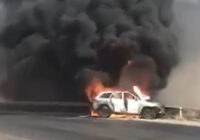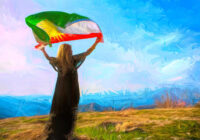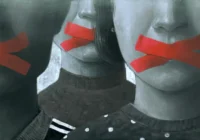On July 17, I visited Geneva, Switzerland, with my father. Of course, we had plans to visit famous sites, including the International Museum of the Red Cross and Red Crescent. After we accidentally exited the bus too early, a small protest quickly derailed our projected 15-minute walk. Ever the lover of civil disobedience, I had to see what it was about.
As we got closer, things became clearer. I could make out the map of Kurdistan — my home nation — on the protestor’s banners. Kurds are an ethnic group spread across neighboring regions in Armenia, Iraq, Iran, Syria and Turkey. Although Kurdistan has never achieved independence as a state, its borders are widely recognizable.

Via the Central Intelligence Agency.
The protest was precisely in front of the United Nations Office, whose picturesque, flag-adorned lawn was quiet aside from the few dozen protestors. The protestors accused Turkey of plotting genocide against Kurds — a claim that is not without merit.
Kurds have faced a century of tragedy. In the 1930s, the young Turkish Republic brutally put down rebellions in Kurdish areas, killing tens of thousands of civilians. More recently, Saddam Hussein’s Baathist regime carried out a genocide in Iraq’s Kurdish-populated north. Today, the regime of Turkish President Recep Tayyip Erdoğan continues to carry out violence against Kurds in Syria while restricting their political rights at home. It is hard not to feel the desperation of a people that, even here in the world capital of diplomacy, seems to go unheard.
Who is Abdullah Öcalan?
Flags featuring Kurdistan’s borders and posters of former Kurdish Workers’ Party (PKK) leader Abdullah Öcalan festooned the protest in Geneva. The protestors chanted slogans calling for Öcalan’s release. The 75-year-old man has spent the last 25 years of his life in a Turkish prison.
Many Kurds adore Öcalan. They affectionately refer to him as Apo (“Uncle”). Born in 1949 to a Turkish Kurd family, Öcalan once attempted to enlist in the Turkish army. As a young man, he dropped out of Ankara University after being jailed for distributing leftist leaflets. Although he has never attained a college degree, Öcalan enjoys a reputation as a man of intelligence and education — at least according to my dad.
Öcalan took his university exposure to Marxism to heart, and he has remained a lifelong leftist. After his university experience, Öcalan became an advocate for Kurdish independence. In 1977, he and two comrades published a manifesto, “The National Road to the Kurdish Revolution,” which laid the foundation for the PKK’s philosophy. Kurdish liberation was to be attained by any means necessary, including violence.
Two years later, Öcalan and his comrades fled from Turkey to Syria. There, they began recruiting local ethnic Kurds and training them as guerrillas. These fighters became the core of the PKK. Five years later, the PKK started its armed campaign, fighting Turkish forces and assuming control of a small village in southeastern Turkey. The PKK insists that it only targets Turkish military and has never admitted to attacks against civilians.
Turkey, the US, the EU and much of the international community declared Öcalan and the PKK terrorists. Many Kurds, however, view him as a revolutionary.
Öcalan’s reign as PKK leader lasted 15 years before his imprisonment in 1999. Turkey has accused him of kidnapping Western tourists, killing civilians and even targeting his own people who dared to challenge him during this time. Ask one of his supporters, however — including my dad — and you will hear a story of Turkish intelligence fabricating narratives and creating setups.
Öcalan went on to flee successively to Lebanon, Russia, Greece and several other countries to avoid capture by Turkish authorities. All the while, he remained in charge of the PKK. In 1999, Kenya captured Öcalan and extradited him to Turkey. A Turkish court sentenced him to death for treason.
Öcalan did not get a fair trial
After the arrest, Kurds all over the world protested at Kenyan embassies, as well as Turkish, Greek and American ones, to no avail.
In 2004, Turkey — hoping to join the EU — abolished the death penalty. Thus, Öcalan’s sentence was commuted to life imprisonment.
In 2005, the European Court of Human Rights (ECHR) ruled Öcalan’s trial unfair. The court pointed out that Turkey prevented Öcalan’s lawyers — including both Turkish and Dutch citizens — from seeing their client. The court recommended a retrial, which Turkey refused.
Öcalan attempted to bargain his freedom by negotiating a ceasefire between the PKK and the Turkish government. Not only was the attempt unsuccessful, but the ceasefire also failed to stick. The PKK broke the first ceasefire in 2004. Another ceasefire started in 2009 and ended in 2011 and a third started in 2012 and ended in 2015. All the while, Öcalan has continued to advocate for a negotiated agreement for Kurdish autonomy in Turkey along lines similar to Kurdish Regional Government in northern Iraq.
This brings us to July 17. A quarter century after his arrest, Öcalan’s supporters are still protesting for him. A few dozen independent Kurds in bright yellow vests have to stand in front of the UN building in Switzerland and plead a case that the ECHR has already ruled on. Turkey still will not listen.
As I sat on the bus back to my hotel, I read about Öcalan and asked my dad questions about him, I hear two different perspectives: one from world powers (the US, the EU) and the other from a Kurdish man who insisted the plight of the Kurds should have been in the Red Cross and Red Crescent museum.
The logical side of me struggles with the inconsistency. If Öcalan is a terrorist, why didn’t Turkey simply convict him in a fair trial? If Öcalan is a hero, why does he have such a checkered story?
I decided that, at the very least, Öcalan deserves a new trial. Turkey’s refusal does not prove Öcalan innocent, but it speaks volumes on the country’s position in Kurdistan. Why are they afraid of making their case in court?
Further, when with the US and the EU finally put pressure on NATO- and Council of Europe-member Turkey to stop hiding behind “terrorism” as an excuse and end its persecution of an ethnic minority? Has the West ever been shy about prodding the Middle East before?
Yet the Kurdish diaspora seems condemned to speak out alone. This protest in Geneva has been recurring weekly since January 2021. All the while, Öcalan remains isolated on Mralı Island, a prison similar to Alcatraz, in the Sea of Marmara. Turkey emptied the prison island for Öcalan, keeping him alone for ten years from 1999 to 2009. Since then, with no visits from family or lawyers, Öcalan’s only company is a few other convicts. Even now, the old man is allowed just a few hours a week of face time with fellow human beings.
As far as we can foresee, the Kurdish diaspora will have to keep protesting.
[Anton Schauble edited this piece.]
The views expressed in this article are the author’s own and do not necessarily reflect Fair Observer’s editorial policy.
Support Fair Observer
We rely on your support for our independence, diversity and quality.
For more than 10 years, Fair Observer has been free, fair and independent. No billionaire owns us, no advertisers control us. We are a reader-supported nonprofit. Unlike many other publications, we keep our content free for readers regardless of where they live or whether they can afford to pay. We have no paywalls and no ads.
In the post-truth era of fake news, echo chambers and filter bubbles, we publish a plurality of perspectives from around the world. Anyone can publish with us, but everyone goes through a rigorous editorial process. So, you get fact-checked, well-reasoned content instead of noise.
We publish 2,500+ voices from 90+ countries. We also conduct education and training programs
on subjects ranging from digital media and journalism to writing and critical thinking. This
doesn’t come cheap. Servers, editors, trainers and web developers cost
money.
Please consider supporting us on a regular basis as a recurring donor or a
sustaining member.
Will you support FO’s journalism?
We rely on your support for our independence, diversity and quality.











Comment